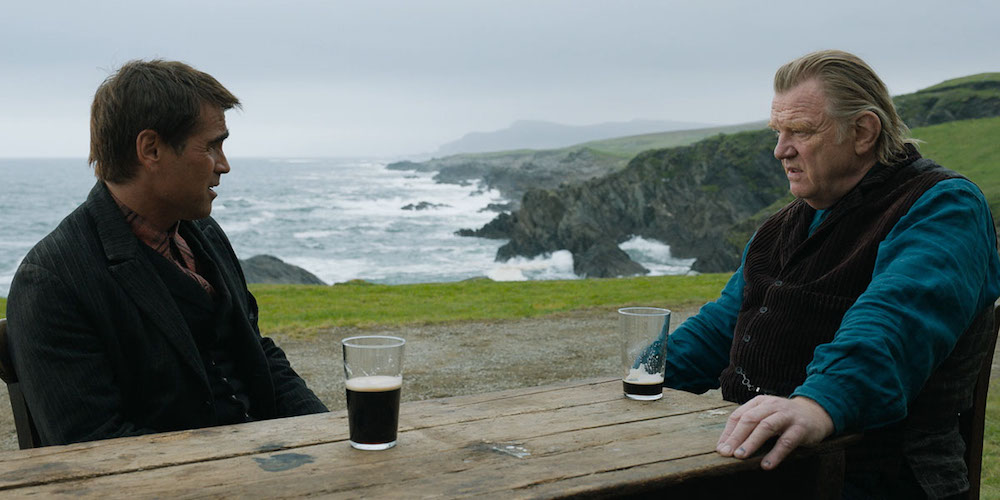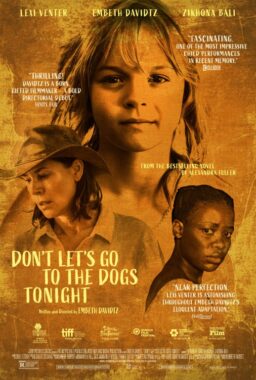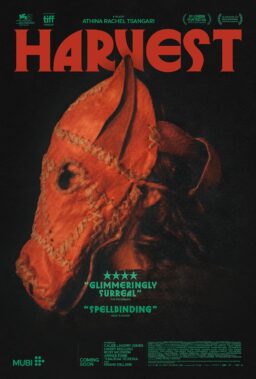The Oscars may still be six months away, but Oscar season officially kicked off a few weeks ago with the Venice, Telluride, and Toronto film festivals. Fourteen of the last 15 Best Picture winners played at least one of those fests on their way to Oscar glory, with last year’s “CODA” being the lone exception. So there’s an excellent chance that this year’s eventual Best Picture winner has already premiered.
What’s fun about the beginning of awards season is starting to figure out what the pertinent questions are. We don’t know much yet, but we know what we don’t know. For example, we don’t know how Academy voters will react to two major critical and commercial successes from earlier in the year, “Everything Everywhere All at Once” and “Top Gun: Maverick.” We also don’t know what to expect out of the five major possible contenders that haven’t premiered yet: “She Said,” “Till,” “Black Panther: Wakanda Forever,” “Avatar: The Way of Water,” and “Babylon.”
All of those will be unveiled in the next few months, but with every other likely awards contender having already premiered, we can start digging into the major questions looming over each race. With that spirit in mind, let’s take stock of where we are with the top six Oscar categories post-Toronto, and we’ll dive into each race with that category’s biggest question.

Best Picture
The Big Question: How many sequels can get in?
The Best Picture category was reset last year to a permanent field of ten nominees, and as many as four of those slots could end up going to major sequels. “Glass Onion: A Knives Out Mystery” premiered to rave reviews in Toronto, and Netflix hopes to launch it into a viable long-term franchise. Its predecessor, “Knives Out,” is widely assumed to have just barely missed out on a Best Picture nomination three years ago (while still receiving a Best Original Screenplay nomination), so the love for the series certainly seems to be there with Oscar voters. The same is true for the new “Black Panther” and “Avatar” films, whose first installments were major Oscar players, and “Top Gun: Maverick,” which has already become one of the most successful films of all time.
The open desire of the Oscars to return to more widespread appeal, along with the obvious love and acclaim for these franchises, could put all four of these sequels into the Best Picture race. But they’re also all competing with each other, and if Academy voters are hesitant to let their ballots become overrun with franchise films, some of these movies could fall prey to vote-splitting.
How many of these sequels can get in will also depend on how strongly voters feel about the other potential candidates. Steven Spielberg’s “The Fabelmans” won Toronto’s coveted People’s Choice award (the last ten winners have all received Best Picture nominations) while Sarah Polley’s “Women Talking” finished second, and the outstanding reviews for each should put them safely in the field. But after that, very little seems certain.
“The Whale” and “The Banshees of Inisherin” have both been routinely reducing festival audiences to tears, but they’ll have to prove they can have the same effect on normal crowds. “Everything Everywhere All at Once” certainly has a passionate fanbase, while “Elvis” will probably be bolstered by a major awards campaign. Both “The Woman King” and “Empire of Light” could play themselves into the race with theatrical success, while “TÁR” and “Triangle of Sadness” could ride pure critical acclaim to nominations. And then, of course, “She Said,” “Till,” and “Babylon” are still looming. That makes 17 films fighting for 10 spots.

Best Director
The Big Question: Are there any international contenders?
For the last four years, the Best Director field has included at least one nominee for a film in another language. The Academy has become increasingly international over the last half decade—and nowhere is that more the case than in the Directors Branch—so this trend was expected to be the new normal, but this year is already looking like a possible exception.
The Best International Film category is, so far, lacking an apparent juggernaut like “Drive My Car” or “Another Round,” which became so beloved that their directors were nominated as well. If that were to happen again this year, two films that played Toronto could do it: “Decision to Leave” and “All Quiet on the Western Front.” Park Chan-Wook already won Best Director at Cannes for “Decision to Leave,” which continued to build on its momentum in Toronto. And Edward Berger’s remake of “All Quiet on the Western Front” received such rave reviews upon its Toronto premiere that it might be our frontrunner for this year’s Best International Film Oscar. Given the global tastes of the Academy’s Directors Branch, either man could find himself in the final set of five nominees.
Beyond that, the prominent contenders in this category closely mirror the prominent contenders for Best Picture: Steven Spielberg (“The Fabelmans”), Sarah Polley (“Women Talking”), Darren Aronofsky (“The Whale”), Martin McDonagh (“The Banshees of Inisherin”), Gina Prince-Bythewood (“The Woman King”), and Todd Field (“TÁR”) are toward the top of the list. But the Directors Branch is often the one with the most surprises in store on nominations morning, so we certainly shouldn’t rule out filmmakers who created excessively indie work (like “Everything Everywhere All at Once”) or excessively populist movies (like “Top Gun: Maverick”).
The other big story in this race is Spielberg himself. It’s no secret that Steven Spielberg is one of the most revered and decorated filmmakers to ever live, but he’s actually on a rather prominent Oscar losing streak. Since winning his second Best Director Oscar almost 24 years ago (for “Saving Private Ryan”), Spielberg has been on the losing end of 11 consecutive Oscar nominations. Never has that losing streak looked more likely to end than this year.

Best Actor
The Big Question: Can anyone seriously challenge Brendan Fraser?
From the moment “The Whale” premiered in Venice a few weeks ago, Brendan Fraser winning Best Actor has looked like the safest bet on the Oscar board. He checks nearly every box for Oscar narratives and voter trends, from being a storied comeback role, to having a 30-year career that’s never really been awarded, to the old “they let themselves be ugly” reasoning we hear every year (and which worked for Charlize Theron, Nicole Kidman, and Jessica Chastain, among others), to the “Best Acting = Most Acting” philosophy that we see voters frequently fall back on.
But perhaps more than all of that, Fraser truly does give a wonderful performance of beautiful empathy, and he’s been consistently moving audiences to tears every time “The Whale” screens. It’s a performance that doesn’t merely make you think it will win, but has you leaving the theater genuinely hoping you get to watch Fraser give an emotional acceptance speech on Oscar night.
Can anyone else contend with that? The answer might be no, but for the sake of argument, let’s put some names in the mix. The two other good bets for Best Oscar nominations appear to be Bill Nighy for “Living,” which is a beautifully nuanced remake of Akira Kurosawa’s celebrated 1952 film, “Ikiru,” and Colin Farrell, who turns in a career-best (and career-funniest) performance in “The Banshees of Inisherin.” Like Fraser, both Nighy and Farrell are long adored and never nominated, and either one could quickly turn into our likely Best Actor winner if “The Whale” ends up tanking commercially, or becomes the target of more critical ire than is expected.
As for who else might find themselves in the Best Actor running, there are a handful of possibilities. First is a trio of actors from fall festival premieres hoping their performances can overcome the tepid reviews of their films: Jeremy Pope in “The Inspection,” Adam Driver in “White Noise,” and Hugh Jackman in “The Son.” Then there are two populist picks from the summer, Austin Butler for “Elvis” and Tom Cruise for “Top Gun: Maverick,” hoping they can stay in the conversation. Lastly, don’t forget about Gabrielle LaBelle, who wonderfully channels the young Spielberg in “The Fabelmans.” His more famous co-stars have gotten all the buzz so far, but LaBelle’s performance holds the film together, and if “The Fabelmans” becomes the Oscar juggernaut that some expect, LaBelle could easily find himself in the mix.

Best Actress
The Big Question: Who’s the frontrunner: Cate Blanchett, Emma Thompson, or Michelle Yeoh?
While most of the other big races appear to have a clear frontrunner, Best Actress seems to have three. Cate Blanchett might have taken the lead in the last few weeks, with critics far and wide calling her performance in “TÁR” the best of her career. There was a time when that wouldn’t matter, and the fact that Blanchett has already won two acting Oscars (for “The Aviator” and “Blue Jasmine”) would have seemingly ensured she won’t win again. But three different actors (Meryl Streep, Daniel Day-Lewis, and Frances McDormand) have won a third acting Oscar in the last 11 years, which suggests the Academy isn’t nearly as hesitant as we might assume to continue awarding the same people if they think the performances merit it.
But Blanchett will likely be competing against two other actresses who are also viewed as generational talents who turned in the best performances of their careers: Emma Thompson in “Good Luck to you, Leo Grande,” and Michelle Yeoh in “Everything Everywhere All at Once. Which one of these women can take the presumptive lead in the race by racking up precursor awards will be one of this year’s most interesting Oscar storylines to keep track of.
And then there’s this wrinkle. News just hit on Wednesday afternoon that Michelle Williams will apparently be campaigning as a lead actress for her role in “The Fabelmans.” Williams was immediately catapulted into Best Supporting Actress frontrunner status following that film’s Toronto premiere, but who knows if she can wield the same kind of weight in a category that already seems flush with major contenders.
If Blanchett, Thompson, Williams, and Yeoh each claim a spot, who does that leave? Several other possibilities made their case at the fall festivals, including Olivia Colman (“Empire of Light”), Viola Davis (“The Woman King”), Vicky Krieps (“Corsage”), Jennifer Lawrence (“Causeway”), and Florence Pugh (“The Wonder”), but none seem like safe bets. Colman gives a powerful performance and is clearly loved by the Academy, but bad reviews for “Empire of Light” could hurt her chances. Davis might seem like an obvious contender, but there’s some confusion about whether she has a lead or supporting role in “The Woman King.” And waiting in the wings are the leads from “She Said,” “Till,” and “Babylon,” all of whom could upend this race yet again when their films finally premiere.

Best Supporting Actor
The Big Question: Where are the contenders?
In many years, Best Supporting Actor seems to be the category most overflowing with contenders and “they could’ve won in any other year” narratives. But this year it’s paradoxically the shallowest category, and we don’t even have any sure bets for a nomination yet. And yet we have to start somewhere, so let’s look at two of the most acclaimed films from the fall festivals: “The Banshees of Inisherin” and “The Fabelmans.”
Between Brendan Gleeson and Barry Keoghan in “Banshees” and Paul Dano, Judd Hirsch, and Seth Rogen in “Fabelmans,” you could field a worthy set of five nominees just from these two films. But it’s never really that easy, and all five men could hurt one another’s chances. Gleeson also has the category question looming over his candidacy, and it’s easy to make a case for him being considered a lead role or a supporting one, depending on which way the “Banshees” awards campaign wants to play it.
Given all these questions, the safest bet for a nomination might come from the film that only has one male character, “Women Talking.” Ben Whishaw plays the man tasked with taking the meeting minutes of the women doing the talking, and he subtly provides a sturdy anchor to one of the most acclaimed films of the season.
From there, we definitely shouldn’t count out Ke Huy Quan, who made an emotional comeback in “Everything Everywhere All at Once” after a decades-long absence from movies. And three additional performances earned rave reviews at the fall festivals and are hoping their films can carve out space in the conversation: Ralph Fiennes in “The Menu,” Brian Tyree Henry in “Causeway,” and Anthony Hopkins in “Armageddon Time.” Who among these many options can emerge as an actual frontrunner for Best Supporting Actor? Gleeson, Hirsch, and Whishaw seem like the safest bets at the moment, but none of them even feel like sure things to be nominated. This is the most open category on the board.

Best Supporting Actress
The Big Question: What happens with “Women Talking”?
None of the major races is more at the mercy of one film than Best Supporting Actress is with “Women Talking,” which could either dominate the field or get shut out depending on how voters approach the film’s stunning ensemble cast. Between Jessie Buckley, Claire Foy, and Rooney Mara, there are three obviously awards-worthy performances at the center of the film, and it’s not difficult to imagine some of the other cast members, like Sheila McCarthy, gaining awards traction as well. Will the “Women Talking” awards team opt to campaign everyone as a supporting actress, or will they try to convince us one of them is actually a lead role? And will Oscar voters view the film as being worthy of multiple nominations in the same race, or will each of these deserving women end up cannibalizing each other’s chances? How these questions play out will determine everything about the Best Supporting Actress category.
Beyond “Women Talking,” this race was left suddenly wide open with the above-mentioned news that Michelle Williams would be campaigning as a lead for “The Fabelmans” (though keep in mind that voters could still ignore the campaign and nominate her as a supporting performance). But multiple films from the fall festivals made strong cases that they should be a factor here, including “The Banshees of Inisherin,” “Glass Onion: A Knives Out Mystery,” “The Inspection,” “The Whale,” and “The Woman King.”
Other than “Women Talking,” “The Whale” is the other film that could conceivably get more than one nomination in this category. Both Sadie Sink and Hong Chau give wonderfully vulnerable performances, and either one could become a major frontrunner here as the season plays out. The same is true of Kerry Condon’s performance in “The Banshees of Inisherin,” which goes toe to toe with everything Farrell, Gleeson, and Keoghan bring to the film. Given how little we know about what might happen with “Women Talking,” Chau, Condon, and Sink might be the safest bets for nominations here.
But other contenders abound, beginning with Janelle Monáe, who absolutely steals the show in “Glass Onion.” If the “Knives Out” sequel plays as successfully to normal audiences as it did to Toronto audiences, Monáe might become a top contender. Other possibilities here include Gabrielle Union for “The Inspection” and Thuso Mbedu for “The Woman King,” though Union’s performance might fall prey to her film getting mixed reviews, while Mbedu could easily be seen as a lead in “The Woman King.” But it ultimately all comes down to whether voters want to let “Women Talking” dominate the category, or if they’d rather spread the love.











